#Induce cow manure
Explore tagged Tumblr posts
Text
Allamanda plant








#s dark yellow flowers. And this plant grows up to 15 feet tall.#allamanda cathartica plant#Allamanda blanchetti#Allamanda blanchetti is also known as purple allamanda. This variety produces a deep purple flower. And this plant grows up to 10 feet tall#allamanda blanchetti#How to grow allamanda plant#allamanda creeper growth#Soil#Allamanda survives in sandy loam soil. Excess water logging is not good for allamanda creepers. So#the PH range of soil should remain between 6.0 to 7.0. Induce the soil with organic matters like cow manure#and goat manure which provides additional nutrients to the plant. And mulching above the soil to maintain its moisture level.#allamanda plant#Water#Allamanda creeper required a minimum amount of water to survive. At the same time#allamanda is intolerant to excessive water. Watering twice a week is enough for Allamanda.#allamanda creeper#Sunlight#Allamanda plants survive in full sunlight. Allamanda flower need minimum six hours of sunligt. Ample amount of sunlight is need for proper#allamanda cathartica#Flower#Allamanda creepers produce funnel-shaped flowers with five overlapped petals that spread outwards. There are a few varieties such as allama#allamanda chocolate#and allamanda Indonesia sunset. And popular varieties of allamanda flowers are allamanda cathartica and allamanda blanchetti.#alamanda flower#Fertilizers#Give NPK fertilizer at proper ratio in the gap of 2-4 weeks. fertilizer is given at the base of the plants.#alamanda creeper fertilizer#Pruning#Early spring is better for pruning just before new growth begins. To maintain overall health and appearance pruning is an essential thing t#dead
1 note
·
View note
Text
Coleus scutellarioides









#Allamanda plant#climbers#and shrubs. It is used for traditional medicines to treat jaundice#malaria#and liver tumors.#allamanda plant#Allamanda varieties#Majorly two varieties of Allamanda are throughout the world.#Allamanda cathartica:#Allamanda cathartica is has another name called a golden trumpet. This variety produces dark yellow flowers. And this plant grows up to 15#allamanda cathartica plant#Allamanda blanchetti#Allamanda blanchetti is also known as purple allamanda. This variety produces a deep purple flower. And this plant grows up to 10 feet tall#allamanda blanchetti#How to grow allamanda plant#Allamanda shrub and allamanda creeper both are propagated through stem cuttings. Initially choose a healthy matured mother plant and cut be#allamanda creeper growth#Soil#Allamanda survives in sandy loam soil. Excess water logging is not good for allamanda creepers. So#the PH range of soil should remain between 6.0 to 7.0. Induce the soil with organic matters like cow manure#and goat manure which provides additional nutrients to the plant. And mulching above the soil to maintain its moisture level.#Water#Allamanda creeper required a minimum amount of water to survive. At the same time#allamanda is intolerant to excessive water. Watering twice a week is enough for Allamanda.#allamanda creeper#Sunlight#Allamanda plants survive in full sunlight. Allamanda flower need minimum six hours of sunligt. Ample amount of sunlight is need for proper#allamanda cathartica#Flower#Allamanda creepers produce funnel-shaped flowers with five overlapped petals that spread outwards. There are a few varieties such as allama
0 notes
Text
Allamanda plant
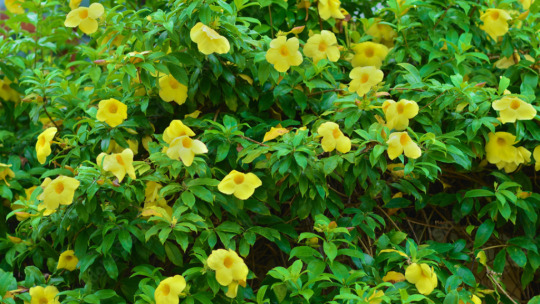
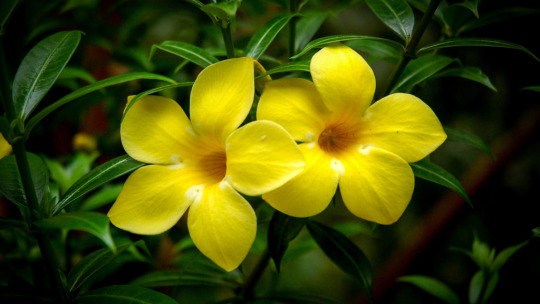

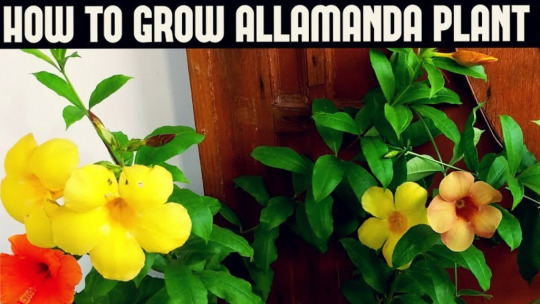
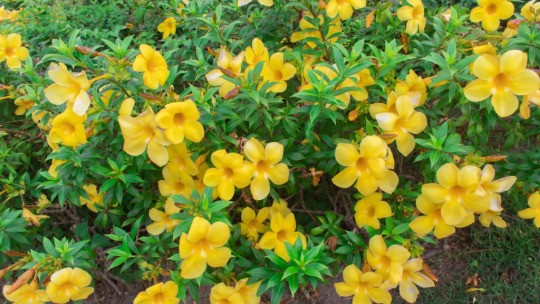


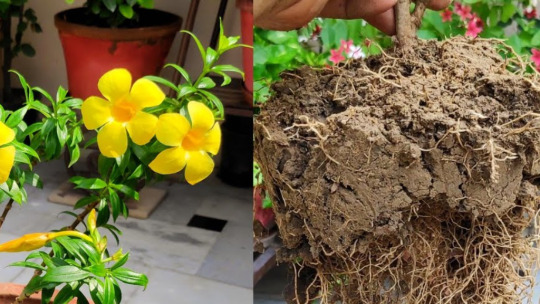
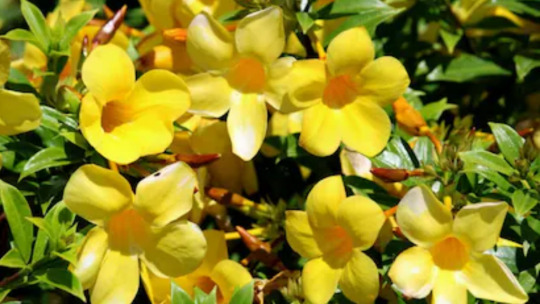
#Allamanda plant#climbers#and shrubs. It is used for traditional medicines to treat jaundice#malaria#and liver tumors.#allamanda plant#Allamanda varieties#Majorly two varieties of Allamanda are throughout the world.#Allamanda cathartica:#Allamanda cathartica is has another name called a golden trumpet. This variety produces dark yellow flowers. And this plant grows up to 15#allamanda cathartica plant#Allamanda blanchetti#Allamanda blanchetti is also known as purple allamanda. This variety produces a deep purple flower. And this plant grows up to 10 feet tall#allamanda blanchetti#How to grow allamanda plant#Allamanda shrub and allamanda creeper both are propagated through stem cuttings. Initially choose a healthy matured mother plant and cut be#allamanda creeper growth#Soil#Allamanda survives in sandy loam soil. Excess water logging is not good for allamanda creepers. So#the PH range of soil should remain between 6.0 to 7.0. Induce the soil with organic matters like cow manure#and goat manure which provides additional nutrients to the plant. And mulching above the soil to maintain its moisture level.#Water#Allamanda creeper required a minimum amount of water to survive. At the same time#allamanda is intolerant to excessive water. Watering twice a week is enough for Allamanda.#allamanda creeper#Sunlight#Allamanda plants survive in full sunlight. Allamanda flower need minimum six hours of sunligt. Ample amount of sunlight is need for proper#allamanda cathartica#Flower#Allamanda creepers produce funnel-shaped flowers with five overlapped petals that spread outwards. There are a few varieties such as allama
0 notes
Text
Allamanda plant









#Allamanda varieties#Majorly two varieties of Allamanda are throughout the world.#Allamanda cathartica:#Allamanda cathartica is has another name called a golden trumpet. This variety produces dark yellow flowers. And this plant grows up to 15#allamanda cathartica plant#Allamanda blanchetti#Allamanda blanchetti is also known as purple allamanda. This variety produces a deep purple flower. And this plant grows up to 10 feet tall#allamanda blanchetti#How to grow allamanda plant#Allamanda shrub and allamanda creeper both are propagated through stem cuttings. Initially choose a healthy matured mother plant and cut be#allamanda creeper growth#Soil#Allamanda survives in sandy loam soil. Excess water logging is not good for allamanda creepers. So#the PH range of soil should remain between 6.0 to 7.0. Induce the soil with organic matters like cow manure#and goat manure which provides additional nutrients to the plant. And mulching above the soil to maintain its moisture level.#allamanda plant#Water#Allamanda creeper required a minimum amount of water to survive. At the same time#allamanda is intolerant to excessive water. Watering twice a week is enough for Allamanda.#allamanda creeper#Sunlight#Allamanda plants survive in full sunlight. Allamanda flower need minimum six hours of sunligt. Ample amount of sunlight is need for proper#allamanda cathartica#Flower#Allamanda creepers produce funnel-shaped flowers with five overlapped petals that spread outwards. There are a few varieties such as allama#allamanda chocolate#and allamanda Indonesia sunset. And popular varieties of allamanda flowers are allamanda cathartica and allamanda blanchetti.#alamanda flower#Fertilizers#Give NPK fertilizer at proper ratio in the gap of 2-4 weeks. fertilizer is given at the base of the plants.
0 notes
Text


While I'm working on my Honduran Milks bioactive, I did wanna take the time to talk about Links Bioactive. Link is my overweight[He's working on it! <3] Male Emergency re-home Ball Python. I typically avoid this species, but he's been a fantastic little Unicorn for me. So lets talk about Link's enclosure and how it works! Link is in a 4ft x 2ft x 2ft PVC Enclosure- this is the *minimum* size this species requires to thrive. His substrate is made up of a layer of perlite sitting at the bottom of his enclosure, this layer of perlite acts as a drainage layer. This drainage layer, which catches excess water that seeps through the substrate. It also helps with catching potentially bad bacteria, and helps with your plants roots! The rest of the substrate sitting ontop of that layer of perlite is a mix of Ecogro organic topsoil, Coco fiber, and Sphagnum moss. I cannot stress this enough, but if you choose to do a bio-active enclosure PLEASE be sure to choose a organic substrate!! Fertilized substrate can be toxic to your animal, this includes manure-based fertilizers. To promote healthy growth, I choose to use Coco fiber and Sphagnum Moss. The Coco fibe[Coco peat] Is a safer way to promote healthy soil for both your plant, and your animals, while the Sphagnum Moss is fantastic at holding water and Nutrients for your plants. The arguably biggest and most important part of this enclosure is the cleanup crew. Your cleanup crew will break down decaying plant matter and your animals feces and return it to the soil, as well as cleaning bacteria growth. Bio-actives cannot function in the long-run without a cleanup crew. The cleanup crew I chose consist of Dairy Cow isopods[Porcellio laevis], and Temperate Springtails[Collembola sp.]. You can Mix-and match your Isopods and Springtails as long as its a species that can tolerate the humidity and temps your animal requires, HOWEVER! Its important to note your Isopod species. I chose not to mix Isopods in this enclosure as Dairy cows are kinda known for being aggressive. For plants, ball Pythons are incredibly Bulldozery animals and will trample much of your flora. Needing hardy plants that could survive being trampled and occasionally uprooted was a must for him, and after thought and research, I ended up settling on these: Golden Pothos, Snake plants, and Jade Pothos. Some just overall incredibly hardy plants that, since having them, I've found fantastic success with surviving Links night-time pathing and assaults. I also have a Philodendron [Monstera adansonii,] in there, providing cover and clutter around and over his hot hide. I'm proud of this plant surviving so far, to say I added it with a specific reason would be a goddamn lie lmao I just loved how cool it looked. The fact it's survived and adapted for as long as it has is a miracle in of itself, and I wish great health amongst this trooper of a plant. I deep water once a week to keep my plants healthy and the soil moist enough for my isopods to thrive, with occasional spraying staggered through the week. Overall, this is how Links Bioactive tank is settup! Is this the only way to set up a Bioactive tank? Certainly not! There's plenty of ways you can setup a Bioactive. Does your animal absolutely NEED a bioactive enclosure? For a lot of animals that answers going to be no! It doesn't. Bio-active vs Non-bio-actives have their pros and cons that, maybe Ill ramble about in a later post. And probably talk on what a Bioactive even is and go into much more detail than I did here about how it works. But I chose Bioactive personally because the long-term upkeep is less costly and labor-inducing, and I just love the looks of them. AndICanHaveAsManyGoddamnIsopodsAsIWant<3
#bioactive#vivarium#info dump#biology#ball python#reptile#isopods#plants#I got lazy towards the end and just started saying Bioactive#herpetology#snake#botony#horticulture
63 notes
·
View notes
Text
Parijat
The Parijat flower is often called Pavazhamalli. This Parjiat tree is said to the heavenly plant as this tree plant is believed to be bought by Lord Krishna to the earth. Majorly this flowering plant has much spiritual & medicinal importance.

Parijat tree
The Parijat tree is a small shrub, a perennial plant that grows up to the height of 3 to 4 feet tall tree.

Parijat flower
The flowers are very fragrant and look like coral (pavalam) with an attractive long orange stigma. Pinwheel flowers contain 5 to 8 petals together. Flower blooms in clusters. And this plant follows dusk & dawn timings.

Night jasmine
Parijat common name is Night flowering jasmine. The reason behind this night blooming is due to hormone called as florigen (flower-generating hormone) it gets migrated from leaves to flowering shoots during the day time & it collects in flowering shoots, induces flower during night time.

Nyctanthes arbor-tristis
This plant is scientific name called Nyctanthes arbor-tristis and belongs to the family Oleaceae ( jasmine family). This is not true jasmine but it is placed under the jasmine family for the fragrance.

Leaves
Night-blooming jasmine tree leaves are rough & contain D-mannitol, flavanol glycosides & others.

Soil
Well-drained sandy loamy soil with a good compost mixture such as cow manure or vermicompost.
And also grows well in a good organic coco peat potting mix.

SunlightNight-blooming jasmine plant is sun lovers and requires direct sun light for about 6 hours.

Water
Regular watering to plant is necessary as these plants are thirsty. Make the soil constantly moist by saturating it with water.

Fertilizer Application
Organic fertilizer application is a must during flower blooming seasons such as August- January.
Water the plants after fertilizer application.

Transplanting or Repotting
Transfer the plants to a good soil surface 5-6 months after planting. Repot the plants when the root ball grows through the drainage holes.
Pruning
Trim the old & dried plant parts.
Pest & Disease
In the Winter season, a woody caterpillar, mealy bugs & aphids may be found.


Control
The Neem oil or citrus oil is sprayed to the plants in diluted form only at the required. Avoid fertilizer application in direct sun light.

Benefit
The Parijat flower has mythological & spiritual importance.
In Ayurveda leaves & stem has the most importance. Cures joint pain, malaria, intermittent fever, coughs & cold.
These green leaves have anti-bacterial & anti-inflammatory properties.

Don’ts
The biggest enemy of this plant is over-watering & avoiding water spillage over the flowers which may lead to fungal attacks.
Timely pruning of the plants to avoid pest & disease.
Growing plants by organic & natural methods is an excellent practice. Promotes healthy food, and a more oxygenated environment improves soil health & makes your environment green, fresh & makes you stress-free.

Green Earth makes Happy Earth!!
Parijat flower plant- Eco-friendly plants.
Blog created by : Santhionlineplants
2 notes
·
View notes
Text
The Unsustainable Truth: How Animal Agriculture is Killing Our Planet

Introduction:
When most people think of climate change, they often picture exhaust-belching cars or smokestacks emitting plumes of pollution. While these sources undoubtedly contribute to the problem, there is another culprit with an even more significant impact on our planet: animal agriculture. Responsible for a tremendous carbon footprint, the livestock industry plays a substantial role in exacerbating climate change. In this blog post, we will explore the environmental consequences of animal agriculture's carbon emissions and discuss sustainable alternatives to mitigate its impact.
The Link between Animal Agriculture and Carbon Emissions

Unveiling the workings of greenhouse gas emissions in animal agriculture:
Methane, a potent greenhouse gas (GHG) emitted during enteric fermentation and manure management, is a major contributor to animal agriculture's carbon footprint. Cows, for instance, release considerable amounts of methane through their digestive processes. Additionally, nitrous oxide emissions from manure management and synthetic fertilizers further exacerbate the problem. Moreover, the indirect carbon emissions associated with deforestation for pastureland and feed production must not be overlooked.
Statistical evidence illustrating the scale of animal agriculture's carbon footprint:
To comprehend the magnitude of the issue, it is imperative to examine the numbers. Globally, livestock production is estimated to generate nearly 15% of all human-induced GHG emissions. That surpasses the emissions from the entire transportation sector, including cars, trucks, ships, and airplanes. Furthermore, animal agriculture is responsible for approximately 80% of all deforestation in the Amazon rainforest, leading to a loss of biodiversity and further increasing carbon emissions.
Environmental Consequences of Animal Agriculture's Carbon Footprint

Impact on climate change:
The staggering emissions from animal agriculture greatly contribute to the greenhouse effect and subsequent global warming. As a result, we are witnessing severe weather patterns, melting glaciers, and rising sea levels. The emissions create a vicious feedback loop, exacerbating climate change and its impacts on ecosystems and communities worldwide.
Deforestation and loss of biodiversity:
Animal agriculture drives deforestation on a massive scale. Immense areas of valuable rainforests are cleared to create pastureland for livestock or grow feed crops like soybeans and corn. This destruction of natural habitats leads to the loss of countless plant and animal species, disrupts the delicate balance of ecosystems, and releases stored carbon into the atmosphere.
Water scarcity and pollution:

Animal agriculture accounts for a considerable portion of global freshwater consumption. Water is needed to irrigate crops for animal feed and provide drinking water for livestock. Consequently, it contributes to water scarcity in many regions. Furthermore, the intense use of fertilizers and the improper management of animal waste leads to water pollution, as runoff carries excess nutrients and pathogens into rivers and oceans.
Sustainable Alternatives to Mitigate Animal Agriculture's Carbon Footprint
Plant-based diets and their environmental benefits:
One of the most effective actions individuals can take to reduce animal agriculture's carbon footprint is to adopt plant-based diets. By choosing plant-based alternatives over meat and dairy, we can reduce the demand for livestock feed crops, decrease deforestation rates, and mitigate emissions associated with animal agriculture. Plant-based diets not only have numerous environmental benefits but also promote personal health and animal welfare.
Technological advancements and innovative solutions:
The emergence of technological advancements offers hope for a more sustainable future. Clean meat, also known as lab-grown or cultured meat, aims to produce real meat without the need for traditional animal farming. This method requires significantly fewer resources, reduces methane emissions, and eliminates the need for deforestation. Additionally, sustainable farming practices, such as regenerative agriculture and improved waste management, can help mitigate the carbon footprint of animal agriculture.
Policy changes and industry transition:
While individual actions are crucial, systemic change is necessary to address the environmental impact of animal agriculture. Governments must implement policies that incentivize sustainable farming methods, support research in alternative protein sources, and promote the consumption of plant-based products. Additionally, consumer awareness and demand for eco-friendly products can exert pressure on the industry, encouraging the adoption of sustainable practices at a larger scale.
Conclusion:
The unsustainable truth is clear: animal agriculture is playing a significant role in the degradation of our planet. Its vast carbon emissions contribute to climate change, deforestation, water scarcity, and the loss of biodiversity. However, by adopting plant-based diets, supporting technological advancements, and driving policy changes, we can make a positive impact. In the face of this global crisis, it is crucial for individuals, industries, and governments to come together and take responsibility for creating a more sustainable future.
#FactoryFarms#MeatFreeMonday#CrueltyFreeFood#VeganLifestyle#SaveTheAnimals#NoMoreFactoryFarms#EndFactoryFarming#GoGreenGoVegan#SaveThePlanetEatPlants#ProtectOurOceans#SaveOurAnimals#GoVeganForYourPeace
0 notes
Text
Definition
Psilocybe cubensis is a species of psychedelic mushroom that is commonly referred to as "magic mushrooms" or simply "shrooms". These mushrooms contain the psychoactive compound psilocybin, which produces a range of effects including altered perception, mood, and thought processes. Psilocybe cubensis is native to tropical and subtropical regions of the world, and is often found growing on or near cow manure or other organic matter. The mushrooms are typically dried and then consumed orally, either alone or mixed with other substances, to induce a psychedelic experience. While Psilocybe cubensis is generally considered safe when used responsibly, it can produce a range of potential physical and psychological side effects, and can be dangerous when used inappropriately or in high doses.
0 notes
Text

Many raw materials for organic fertilizer production contain a lot of water, such as pig manure, cow manure, chicken manure and other raw materials. During the material accumulation and fermentation process, the waste liquid will flow out and enter the ground, polluting the ground water. Therefore, it is necessary to carry out cement hardening and anti-seepage treatment on the ground of the fermentation workshop.
Dust pollution is the primary pollution and requires careful treatment. There are many links in which dust pollution occurs.
(1) Unloading raw materials into warehouses and transporting them in different workshops (2) Throwing raw materials (3) Crushing materials (4) Drying and cooling fertilizer granules. Many organic fertilizer manufacturers will build a dust removal room in the production workshop, and use induced draft fans and dust collectors to deal with the dust problem. Although dust is a source of pollution, these dusts all come from organic fertilizers. After collection, add raw materials for fermentation and continue to produce organic fertilizer.
#organic fertilizer production#organic fertilizer production equipment#organic fertilizer granulator machine
0 notes
Note
This is a request for Clowning around/On the road to clown town if you ever want to continue it, I just love it so much! 💖💖💖
Anything for you, @feline17ff
Part 1
Part 2
Clowning Around, Part 3
The hero was splayed on the ground.
They were on the ground, their head hurt, and there was dirt in their mouth.
I’m just having a lovely day, aren’t I?
They cracked their eyes open, to the sight of an impossibly blue sky above them. The sun beat hot on their face.
“You took quite the tumble there, partner,” a voice said.
The hero suppressed a groan. They had a growing suspicion as to what kind of dimension they’d fallen into.
They sat up with a grimace, and looked around at the cow pasture surrounding them. A small distance away was a wooden fence, with a teenage boy resting his arms upon it.
“You an angel or somethin’?” The boy spoke with a notable country twang.
“Um, no. Why?”
He shrugged. “Would explain how you fell from the sky like a shot-through pigeon.”
Ah, that would explain the hero’s piercing headache.
Beyond the pasture laid miles and miles of desert and chaparral, untouched by roads, buildings, or even phone lines. The kid was dressed in a wide-brimmed hat, leather pants, and boots with spurs. A quick glance downward confirmed that the hero was in a similar getup.
“Kid, what year is it?”
The boy scratched his head. “I reckon it’s still 1866, last I saw a newspaper.”
“Yeah.” The hero let out a deep sigh. “That sounds about right.”
“By the way, you know you’re sitting in man-trap, right?”
The hero looked down again, and realized they’d landed in manure.
They sprung up, cursing, and the boy laughed his head off.
“Just point me to the nearest town, kid.”
The teen gestured, still giggling. The hero trudged towards the fence, steeling themself for a long, heat stroke-inducing trek.
“Ain’t ya gonna take your hoss?”
The hero turned, and saw the boy nod to a pinto horse standing politely amongst the cows.
“It’s not yours?”
“Nope,” the kid said, with a shake of his head. “She came down with you.”
The hero squinted. There had been the elephant and a couple lions in the circus world, but they didn’t remember any horses. Unless . . .
“Balloon horse?!”
“Pardon?”
The hero whizzed forward. “Oh my god, balloon horse, you’re here!” They wrapped their arms around the horse’s neck. “And you’re real!”
The horse gave a cheerful whinny in response.
“You sure ya didn’t smack your head on the way down, partner?” the kid called over.
“Oh, don’t worry about me,” the hero said, stroking the horse’s mane. “This is the best news I’ve gotten all day.”
With some effort (and helpful – if unnecessarily rude – instructions from the kid), the hero finally heaved themself onto the horse’s back. They lifted their gaze to the horizon, and took in the expansive western landscape around them.
It was time to find that damn villain again.
Part 4
#villain#hero#writeblr#snippet#writing snippet#short snippet#writing#heroes and villains#villains and heroes#cowboy#wild west#not as much happened in this one#but don't worry#i already have ideas for a part 4#not a prompt
64 notes
·
View notes
Note
Livestock actually have a very tiny effect on climate change and if the cows are grass fed then just the plants they eat offset a good half of their emissions. As far as climate change we still need to pressure corporations and governments if we want change. All this said the meat industry is full of problems and researching better sources is no less important. Environmental protection is just not the reason it's important.
What is very tiny? What is your source for saying that?
“In the United States, 42 percent of agricultural emissions come from animal agriculture. Two-thirds of those gases are directly emitted by ruminants: animals like cows, buffalo, and sheep that use bacteria in their stomachs to ferment food.“
“Worldwide, livestock accounts for between 14.5 percent and 18 percent of human-induced greenhouse gas emissions.” --New York Times
The IPCC report on agriculture says the following...
“Agriculture releases to the atmosphere significant amounts of CO2, CH4, and N2O. CO2 is released largely from microbial decay or burning of plant litter and soil organic matter. CH4 is produced when organic materials decompose in oxygen-deprived conditions, notably from fermentative digestion by ruminant livestock, and from stored manures. N2O is generated by the microbial transformation of nitrogen in soils and manures, and is often enhanced where available nitrogen (N) exceeds plant requirements, especially under wet conditions.“
Note the “significant amounts.”
And the predictions for the future aren’t great either.
“If CH4 emissions grow in direct proportion to increases in livestock numbers, then global livestock-related methane production is expected to increase by 60% up to 2030. “
Here is what IPCC ecologist Hans-Otto Pörtner says...
“It would indeed be beneficial, for both climate and human health, if people in many rich countries consumed less meat, and if politics would create appropriate incentives to that effect.”
Here is a chart showing the mitigation effects of eating less meat.

“By 2050, dietary changes could free up several million square kilometers of land, and reduce global CO2 emissions by up to eight billion tonnes per year, relative to business as usual, the scientists estimate.“
Perhaps you and I have differing opinions of what tiny means.
35 notes
·
View notes
Text
Allamanda plant
The Allamanda plant is an evergreen perennial flowering plant that belongs to the family Apocynaceae. They are indigenous to America. Some varieties of allamanda yields colorful flowers. Many varieties of allamanda produce yellow flowers and few varieties of allamanda produce pink flowers. Allamanda plant usually grows up to 20 feet. Allamanda plants are classified based on their stem position such as creeper, climbers, and shrubs. It is used for traditional medicines to treat jaundice, malaria, and liver tumors.
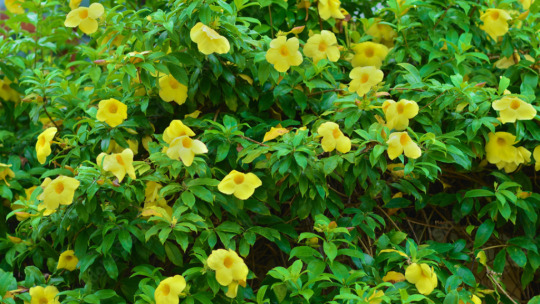
Allamanda varieties
Majorly two varieties of Allamanda are throughout the world.
Allamanda cathartica:
Allamanda cathartica is has another name called a golden trumpet. This variety produces dark yellow flowers. And this plant grows up to 15 feet tall.
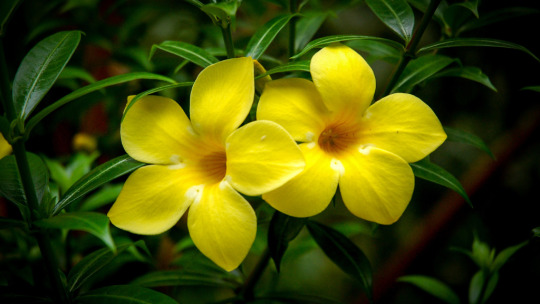
Allamanda blanchetti
Allamanda blanchetti is also known as purple allamanda. This variety produces a deep purple flower. And this plant grows up to 10 feet tall.
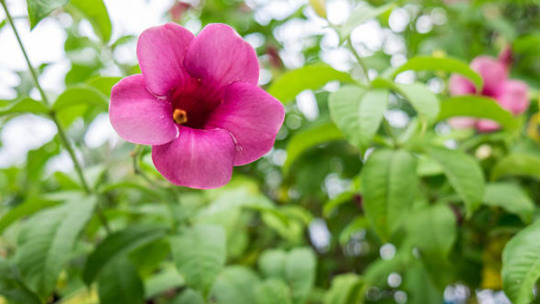
How to grow allamanda plant
Allamanda shrub and allamanda creeper both are propagated through stem cuttings. Initially choose a healthy matured mother plant and cut below the leaf node. While transplanting remove all the leaves from the bottom portion of the stem and leave two couple of leaves at the apical portion and place them in a pot. After 3-5 weeks roots start to generate.
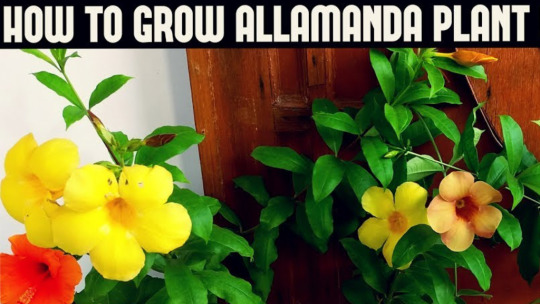
Soil
Allamanda survives in sandy loam soil. Excess water logging is not good for allamanda creepers. So, the PH range of soil should remain between 6.0 to 7.0. Induce the soil with organic matters like cow manure, and goat manure which provides additional nutrients to the plant. And mulching above the soil to maintain its moisture level.
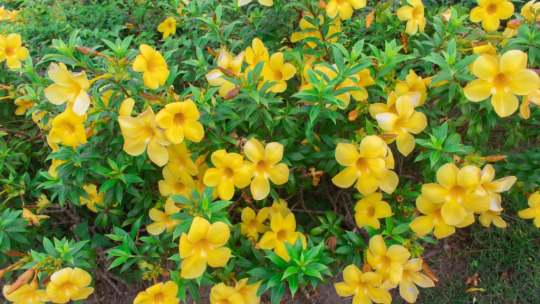
Flower
Allamanda creepers produce funnel-shaped flowers with five overlapped petals that spread outwards. There are a few varieties such as allamanda cream, allamanda chocolate, and allamanda Indonesia sunset. And popular varieties of allamanda flowers are allamanda cathartica and allamanda blanchetti.
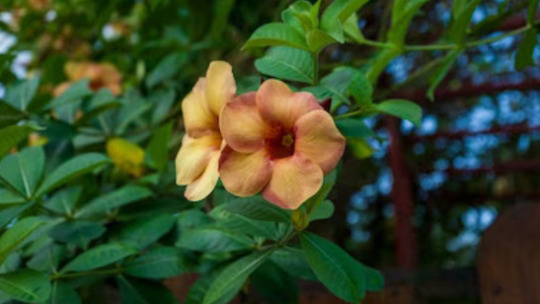
Fertilizers
Give NPK fertilizer at proper ratio in the gap of 2-4 weeks. fertilizer is given at the base of the plants.
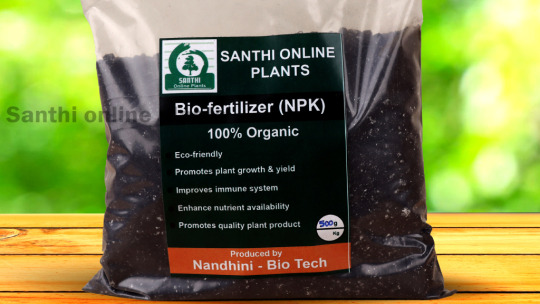
Pruning
Early spring is better for pruning just before new growth begins. To maintain overall health and appearance pruning is an essential thing that removes all diseased, dead, and damaged branches.
Usually, allamanda grows vigorously so, prune it according to your desired size.

Choose green go wild
Blog created by: www.santhionlineplants.com
#Soil#Allamanda survives in sandy loam soil. Excess water logging is not good for allamanda creepers. So#the PH range of soil should remain between 6.0 to 7.0. Induce the soil with organic matters like cow manure#and goat manure which provides additional nutrients to the plant. And mulching above the soil to maintain its moisture level.#allamanda plant#Water#Allamanda creeper required a minimum amount of water to survive. At the same time#allamanda is intolerant to excessive water. Watering twice a week is enough for Allamanda.#allamanda creeper#Sunlight#Allamanda plants survive in full sunlight. Allamanda flower need minimum six hours of sunligt. Ample amount of sunlight is need for proper#allamanda cathartica#Flower#Allamanda creepers produce funnel-shaped flowers with five overlapped petals that spread outwards. There are a few varieties such as allama#allamanda chocolate#and allamanda Indonesia sunset. And popular varieties of allamanda flowers are allamanda cathartica and allamanda blanchetti.#alamanda flower#Fertilizers#Give NPK fertilizer at proper ratio in the gap of 2-4 weeks. fertilizer is given at the base of the plants.#alamanda creeper fertilizer#Pruning#Early spring is better for pruning just before new growth begins. To maintain overall health and appearance pruning is an essential thing t#dead#and damaged branches.#Usually#allamanda grows vigorously so#prune it according to your desired size.#allamanda blanchetti plant pruning#Repotting#Repot the allamanda before its active growth begins. Choose a well-drained potting mix that is suitable for allamanda. After repotting wate
1 note
·
View note
Text
Allamanda plant
The Allamanda plant is an evergreen perennial flowering plant that belongs to the family Apocynaceae. They are indigenous to America. Some varieties of allamanda yields colorful flowers. Many varieties of allamanda produce yellow flowers and few varieties of allamanda produce pink flowers. Allamanda plant usually grows up to 20 feet. Allamanda plants are classified based on their stem position such as creeper, climbers, and shrubs. It is used for traditional medicines to treat jaundice, malaria, and liver tumors.
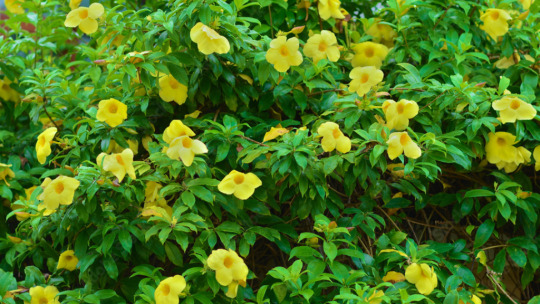
Allamanda varieties
Majorly two varieties of Allamanda are throughout the world.
Allamanda cathartica:
Allamanda cathartica is has another name called a golden trumpet. This variety produces dark yellow flowers. And this plant grows up to 15 feet tall.
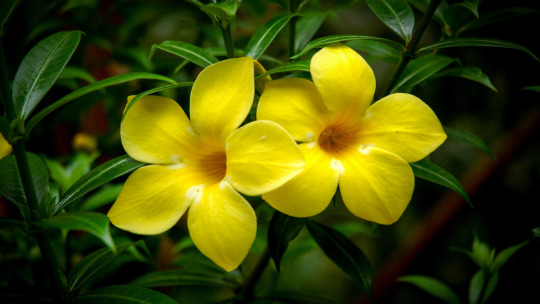
Allamanda blanchetti
Allamanda blanchetti is also known as purple allamanda. This variety produces a deep purple flower. And this plant grows up to 10 feet tall.
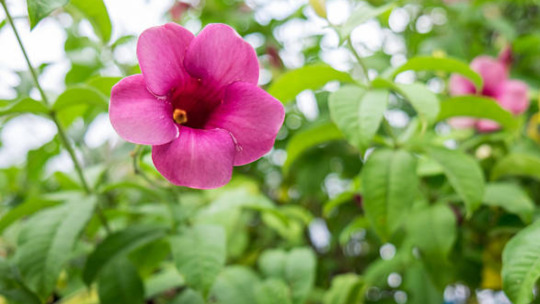
How to grow allamanda plant
Allamanda shrub and allamanda creeper both are propagated through stem cuttings. Initially choose a healthy matured mother plant and cut below the leaf node. While transplanting remove all the leaves from the bottom portion of the stem and leave two couple of leaves at the apical portion and place them in a pot. After 3-5 weeks roots start to generate
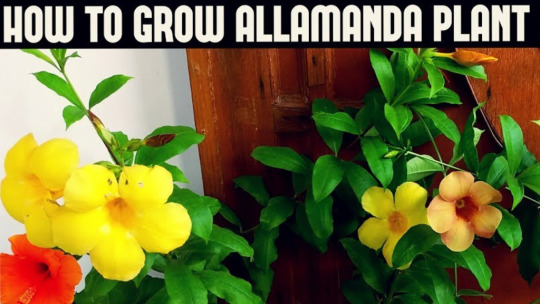
Soil
Allamanda survives in sandy loam soil. Excess water logging is not good for allamanda creepers. So, the PH range of soil should remain between 6.0 to 7.0. Induce the soil with organic matters like cow manure, and goat manure which provides additional nutrients to the plant. And mulching above the soil to maintain its moisture level.
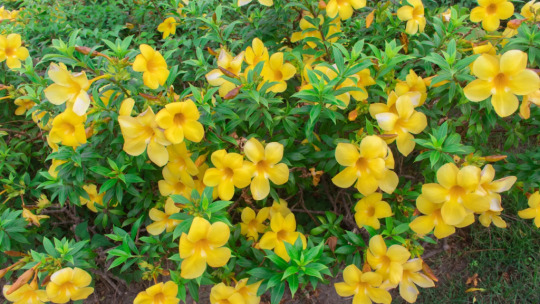
Water
Allamanda creeper required a minimum amount of water to survive. At the same time, allamanda is intolerant to excessive water. Watering twice a week is enough for Allamanda.
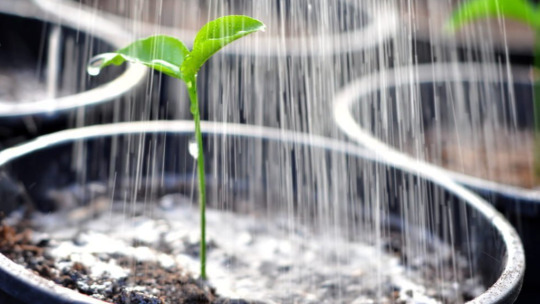
Benefits of allamanda
Allamanda blanchetti are praised for colorful shades and trumpet shape.
Allamanda flower attracts pollinators which promotes a healthy ecosystem.
In traditional medicine, many parts of allamanda are used for various purposes. Allamanda is highly used to treat skin infections, fever, and certain stomach issues.
Allamanda flower possesses some anti-inflammatory properties which reduce inflammation.
Plants play a vital role in purifying the air, providing oxygen and it creates a healthier ecosystem.
Allamanda-flower plant
Choose green go wild
Blog created by: www.santhionlineplants.com
#Soil#Allamanda survives in sandy loam soil. Excess water logging is not good for allamanda creepers. So#the PH range of soil should remain between 6.0 to 7.0. Induce the soil with organic matters like cow manure#and goat manure which provides additional nutrients to the plant. And mulching above the soil to maintain its moisture level.#allamanda plant#Water#Allamanda creeper required a minimum amount of water to survive. At the same time#allamanda is intolerant to excessive water. Watering twice a week is enough for Allamanda.#allamanda creeper#Sunlight#Allamanda plants survive in full sunlight. Allamanda flower need minimum six hours of sunligt. Ample amount of sunlight is need for proper#allamanda cathartica#Flower#Allamanda creepers produce funnel-shaped flowers with five overlapped petals that spread outwards. There are a few varieties such as allama#allamanda chocolate#and allamanda Indonesia sunset. And popular varieties of allamanda flowers are allamanda cathartica and allamanda blanchetti.#alamanda flower#Fertilizers#Give NPK fertilizer at proper ratio in the gap of 2-4 weeks. fertilizer is given at the base of the plants.#alamanda creeper fertilizer#Pruning#Early spring is better for pruning just before new growth begins. To maintain overall health and appearance pruning is an essential thing t#dead#and damaged branches.#Usually#allamanda grows vigorously so#prune it according to your desired size.#allamanda blanchetti plant pruning#Repotting#Repot the allamanda before its active growth begins. Choose a well-drained potting mix that is suitable for allamanda. After repotting wate
0 notes
Text
Allamanda plant
The Allamanda plant is an evergreen perennial flowering plant that belongs to the family Apocynaceae. They are indigenous to America. Some varieties of allamanda yields colorful flowers. Many varieties of allamanda produce yellow flowers and few varieties of allamanda produce pink flowers. Allamanda plant usually grows up to 20 feet. Allamanda plants are classified based on their stem position such as creeper, climbers, and shrubs. It is used for traditional medicines to treat jaundice, malaria, and liver tumors.
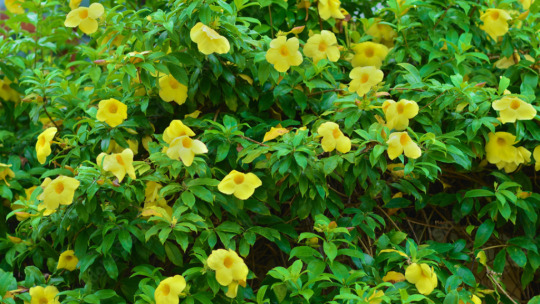
Allamanda varieties
Majorly two varieties of Allamanda are throughout the world.
Allamanda cathartica:
Allamanda cathartica is has another name called a golden trumpet. This variety produces dark yellow flowers. And this plant grows up to 15 feet tall.
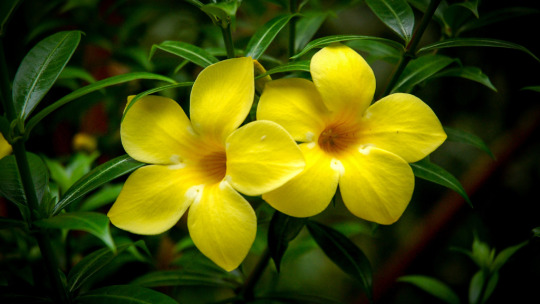
How to grow allamanda plant
Allamanda shrub and allamanda creeper both are propagated through stem cuttings. Initially choose a healthy matured mother plant and cut below the leaf node. While transplanting remove all the leaves from the bottom portion of the stem and leave two couple of leaves at the apical portion and place them in a pot. After 3-5 weeks roots start to generate.
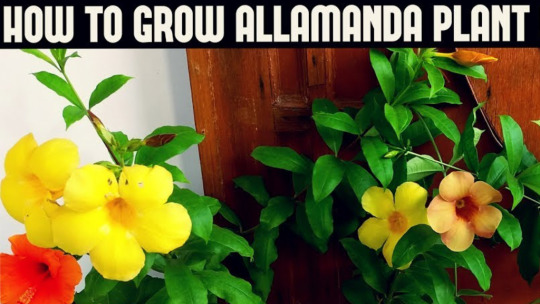
Soil
Allamanda survives in sandy loam soil. Excess water logging is not good for allamanda creepers. So, the PH range of soil should remain between 6.0 to 7.0. Induce the soil with organic matters like cow manure, and goat manure which provides additional nutrients to the plant. And mulching above the soil to maintain its moisture level.
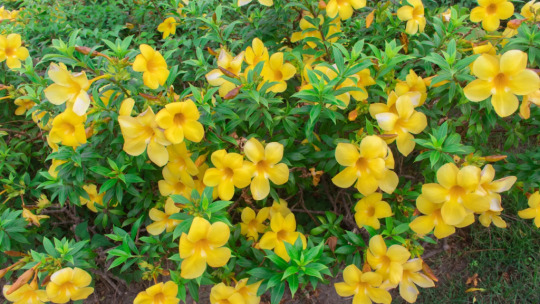
Flower
Allamanda creepers produce funnel-shaped flowers with five overlapped petals that spread outwards. There are a few varieties such as allamanda cream, allamanda chocolate, and allamanda Indonesia sunset. And popular varieties of allamanda flowers are allamanda cathartica and allamanda blanchetti.
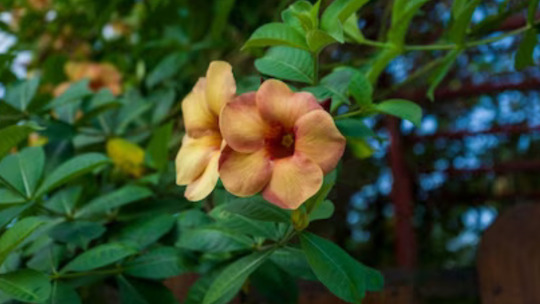
Fertilizers
Give NPK fertilizer at proper ratio in the gap of 2-4 weeks. fertilizer is given at the base of the plants.
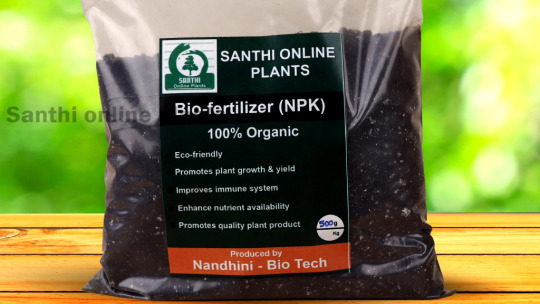
Pruning
Early spring is better for pruning just before new growth begins. To maintain overall health and appearance pruning is an essential thing that removes all diseased, dead, and damaged branches.
Usually, allamanda grows vigorously so, prune it according to your desired size.
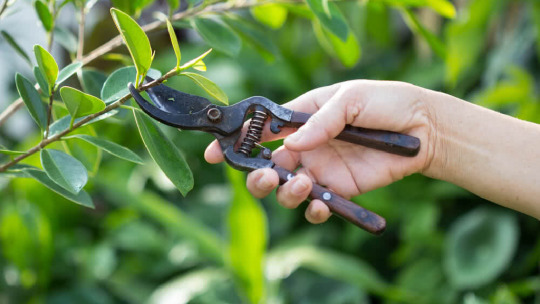
Repotting
Repot the allamanda before its active growth begins. Choose a well-drained potting mix that is suitable for allamanda. After repotting water thoroughly until the water drains. The repotted allamanda placement done in indirect sunlight. Because direct sunlight can affect plant growth. So, inspect the plant's signs regularly.
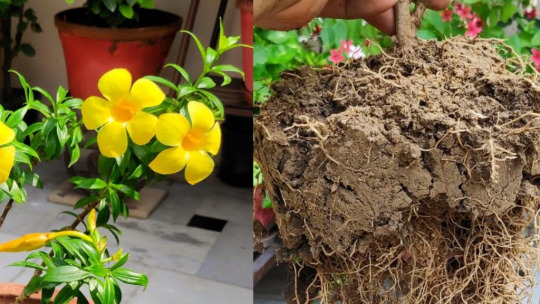
#Allamanda survives in sandy loam soil. Excess water logging is not good for allamanda creepers. So#the PH range of soil should remain between 6.0 to 7.0. Induce the soil with organic matters like cow manure#and goat manure which provides additional nutrients to the plant. And mulching above the soil to maintain its moisture level.#allamanda plant#Water#Allamanda creeper required a minimum amount of water to survive. At the same time#allamanda is intolerant to excessive water. Watering twice a week is enough for Allamanda.#allamanda creeper#Sunlight#Allamanda plants survive in full sunlight. Allamanda flower need minimum six hours of sunligt. Ample amount of sunlight is need for proper#allamanda cathartica#Flower#Allamanda creepers produce funnel-shaped flowers with five overlapped petals that spread outwards. There are a few varieties such as allama#allamanda chocolate#and allamanda Indonesia sunset. And popular varieties of allamanda flowers are allamanda cathartica and allamanda blanchetti.#alamanda flower#Fertilizers#Give NPK fertilizer at proper ratio in the gap of 2-4 weeks. fertilizer is given at the base of the plants.#alamanda creeper fertilizer#Pruning#Early spring is better for pruning just before new growth begins. To maintain overall health and appearance pruning is an essential thing t#dead#and damaged branches.#Usually#allamanda grows vigorously so#prune it according to your desired size.#allamanda blanchetti plant pruning#Repotting#Repot the allamanda before its active growth begins. Choose a well-drained potting mix that is suitable for allamanda. After repotting wate#inspect the plant's signs regularly.
0 notes
Text
Allamanda plant
The Allamanda plant is an evergreen perennial flowering plant that belongs to the family Apocynaceae. They are indigenous to America. Some varieties of allamanda yields colorful flowers. Many varieties of allamanda produce yellow flowers and few varieties of allamanda produce pink flowers. Allamanda plant usually grows up to 20 feet. Allamanda plants are classified based on their stem position such as creeper, climbers, and shrubs. It is used for traditional medicines to treat jaundice, malaria, and liver tumors.

Allamanda varieties
Majorly two varieties of Allamanda are throughout the world.
Allamanda cathartica:
Allamanda cathartica is has another name called a golden trumpet. This variety produces dark yellow flowers. And this plant grows up to 15 feet tall.

Allamanda blanchetti
Allamanda blanchetti is also known as purple allamanda. This variety produces a deep purple flower. And this plant grows up to 10 feet tall.

How to grow allamanda plant
Allamanda shrub and allamanda creeper both are propagated through stem cuttings. Initially choose a healthy matured mother plant and cut below the leaf node. While transplanting remove all the leaves from the bottom portion of the stem and leave two couple of leaves at the apical portion and place them in a pot. After 3-5 weeks roots start to generate

Soil
Allamanda survives in sandy loam soil. Excess water logging is not good for allamanda creepers. So, the PH range of soil should remain between 6.0 to 7.0. Induce the soil with organic matters like cow manure, and goat manure which provides additional nutrients to the plant. And mulching above the soil to maintain its moisture level.

Water
Allamanda creeper required a minimum amount of water to survive. At the same time, allamanda is intolerant to excessive water. Watering twice a week is enough for Allamanda.

Benefits of allamanda
Allamanda blanchetti are praised for colorful shades and trumpet shape.
Allamanda flower attracts pollinators which promotes a healthy ecosystem.
In traditional medicine, many parts of allamanda are used for various purposes. Allamanda is highly used to treat skin infections, fever, and certain stomach issues.
Allamanda flower possesses some anti-inflammatory properties which reduce inflammation.
Plants play a vital role in purifying the air, providing oxygen and it creates a healthier ecosystem.
Allamanda-flower plant
Choose green go wild
Blog created by: www.santhionlineplants.com
#Allamanda blanchetti#Allamanda blanchetti is also known as purple allamanda. This variety produces a deep purple flower. And this plant grows up to 10 feet tall#allamanda blanchetti#How to grow allamanda plant#Allamanda shrub and allamanda creeper both are propagated through stem cuttings. Initially choose a healthy matured mother plant and cut be#allamanda creeper growth#Soil#Allamanda survives in sandy loam soil. Excess water logging is not good for allamanda creepers. So#the PH range of soil should remain between 6.0 to 7.0. Induce the soil with organic matters like cow manure#and goat manure which provides additional nutrients to the plant. And mulching above the soil to maintain its moisture level.#allamanda plant#Water#Allamanda creeper required a minimum amount of water to survive. At the same time#allamanda is intolerant to excessive water. Watering twice a week is enough for Allamanda.#allamanda creeper#Sunlight#Allamanda plants survive in full sunlight. Allamanda flower need minimum six hours of sunligt. Ample amount of sunlight is need for proper#allamanda cathartica#Flower#Allamanda creepers produce funnel-shaped flowers with five overlapped petals that spread outwards. There are a few varieties such as allama#allamanda chocolate#and allamanda Indonesia sunset. And popular varieties of allamanda flowers are allamanda cathartica and allamanda blanchetti.#alamanda flower#Fertilizers#Give NPK fertilizer at proper ratio in the gap of 2-4 weeks. fertilizer is given at the base of the plants.#alamanda creeper fertilizer#Pruning#Early spring is better for pruning just before new growth begins. To maintain overall health and appearance pruning is an essential thing t#dead#and damaged branches.
0 notes
Text
Identifying the Right Hair Loss Drug
You've already asked yourself, "What is the best hair loss product available?" a number of times. The question was posted on Google Answers, and the experts responded? They confirmed that they don't have an answer for that question.
They are right in that there is no one-size-fits-all solution to that question, but there is a one-size-fits-all answer to the alternate question, "What is the best hair loss product for me?" It's still not an easy question to answer, and you'll probably have to rely on good old-fashioned trial and error to figure it out.
Homeopathic Treatments
Hair loss can be handled with a number of home remedies. I'm sure some of them can be ignored — such as rubbing cow manure on the head — but I'm sure some of them are useful to some citizens. Here are a couple of the most promising natural hair loss home remedies:
Use apple cider vinegar and sage tea to rinse your hair. Almond oil, castor oil, olive oil, and amla oil were among the oils used. Usually, the oil is melted, which makes the hair feel nice and shiny. Applying aloe vera gel or coconut oil on your scalp. Applying a honey-and-egg-yolk masque on your hair and scalp.
Except for the apple cider and sage tea rinse, both of these concoctions can be washed out after usage.
Products for Hair Care
A decent shampoo or conditioner may be the right hair loss product for you. Any consumers swear by Nizoral shampoo, saying that it stops hair loss. Some people like Mane and Tail shampoo and conditioner because it gives their hair a fuller, stronger appearance. Your hairdresser may be able to make any recommendations for hair care items that can help you deal with your hair loss.
Herbal Remedies
Some people say that a herbal cure is the safest hair loss treatment. Hair loss can be treated with a variety of natural lotions and potions, as well as dietary supplements. An herbalist will be able to advise you about the right products to use for your specific form of hair loss. Here are some herbal remedies that seem to be effective:
Ginko biloba is a type of Ginkgo biloba. Green tea is a common beverage in Japan. “He shou wu” is a Chinese weed. Pygeum is a kind of pygeum. Aloe vera is a herb that produces aloe vera juice. Palmetto palmetto palmetto palmetto palmetto palm Stinging nettle is a type of nettle that stings when touched.
Some of them are used as pills, and others are applied to the skin as preparations. Some herbal preparations (such as stinging nettles) can induce an allergic reaction, so use caution when using them.
Rogain® (minoxidil)
Many people assume that this is the greatest hair loss product available. It's available at every pharmacy without a prescription, and it works for a lot of people. Minoxidil promotes hair growth in both men and women. However, keep in mind that if you stop using minoxidil, your hair will begin to fall out again.
Medications on Prescription
Propecia, a prescription drug, could be the best hair loss treatment for you. You'll have to go to the clinic to get that, which is a positive thing because she'll do a check-up to see if there's any possible reason for the hair loss that can be permanently addressed.
Weaves, wigs, and rugs
It's possible that the perfect hair loss product for you is a disguise of some kind. This is particularly true when the hair loss is temporary, such as when chemotherapy causes the hair to fall out.
There are various hair loss treatment choices available to you, but only you can determine which is the right hair loss product for you. Try a few different things before you discover one that suits for you. It does not succeed on everybody, but the main thing is that you may have discovered the most effective hair loss treatment for you.
1 note
·
View note